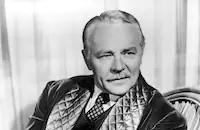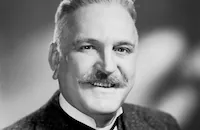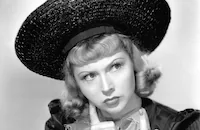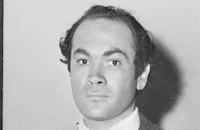The Eddy/Massey Balalaika was based on a hit London stage musical of the same title by Eric Maschwitz, which had in turn been inspired by a German operetta. Eddy plays a Russian prince who falls for cafÈ singer Massey and arranges for her to sing at the Imperial opera. The lovers face a stormy future, since the prince's father is assassinated by the Reds and the singer's father is among the killers. As World War I is about to begin, the singer and her family are exiled to Siberia, while the former Prince becomes a singing sensation in Paris. However, since this is an MGM musical, you may rest assured that the lovers are eventually reunited. The source of the music in Balalaika remains in some confusion, since it includes adaptations by music director Herbert Stothart of tunes from the original Bernard Grun/George Posford score as well as material already owned by MGM. Also included in the mix are excerpts from Bizet's Carmen and Rimsky-Korsakov's Scheherezade. The songs include "At the Balalaika," "Ride, Cossack, Ride," "Ochi Tchornya," "Tanya" and "Shadows on the Sand." In a touching sequence, Eddy sings "Stille Nacht" ("Silent Night") at the Austro-Russian front, with the words echoed by an enemy chorus just before the signal is given for attack. Another poignant moment comes in the film's climax at a Parisian cafÈ where Russian emigres have gathered after the Revolution, with one of them (Frank Morgan) singing of his "Land of Dreams." Balalaika is further distinguished by its outstanding supporting cast and the romantic costume designs of Adrian.
Before Massey was substituted as leading lady, Balalaika had been planned as a vehicle for Eddy and his longtime costar Jeanette MacDonald. Born in Hungary, Massey was discovered for American films by Louis B. Mayer when he attended a performance of Aida in Czechoslovakia and was enchanted by her offstage voice singing the high priestess's aria. After sending an invitation backstage to join him for supper, Mayer was delighted to see that Ilona Hajmassy, as she was then known, was a statuesque blonde with movie-star looks. In addition to being a strong singer, she also was an accomplished dancer (which could not be said of MacDonald).
Massey worked on two other occasions with Eddy, playing the supporting role of a lady-in-waiting to his costar Eleanor Powell in the MGM musical Rosalie (1937) and costarring with him once again in his final film, Northwest Outpost (1947), a musical Western from Republic Pictures. Despite the promise of Balalaika, Massey's career turned out to be a disappointing one that played out in minor film and TV appearances.
Producer: Lawrence Weingarten
Director: Reinhold Schunzel
Screenplay: Charles Bennett, Jacques Deval, Leon Gordon, from play by Eric Maschwitz
Art Direction: Cedric Gibbons, Eddie Imazu (associate)
Cinematography: Joseph Ruttenberg, Karl Freund
Costume Design: Adrian (gowns), Valles (men's)
Editing: George Boemler
Original Music: Bernard Grun, George Posford, Herbert Stothart (also adaptation)
Principal Cast: Nelson Eddy (Prince Peter Karagin, aka Peter Teranda), Ilona Massey (Lydia Pavlovna Marakova), Charles Ruggles (Nicki Popoff), Frank Morgan (Ivan Danchenoff), Lionel Atwill (Professor Marakov), C. Aubrey Smith (General Karagin), Joyce Compton (Masha).
BW-103m. Closed captioning.
by Roger Fristoe





























